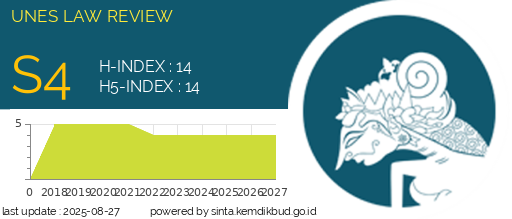Efektivitas Aturan Penggunaan Produk dalam Negeri pada Pengadaan Barang/Jasa Pemerintah
DOI:
https://doi.org/10.31933/unesrev.v6i1.984Keywords:
Domestic Products, Procurement of Goods/Services, Government InstitutionAbstract
Various regulations for the use of Domestic Products have existed since 2014, but implementation in the procurement of goods/services has not run optimally, at least until the end of 2022. Through empirical normative legal research, a study was conducted on the rules for using the Domestic Product. Referring to Lawrence M. Friedman's theory of legal effectiveness, it is known that the cause of the ineffectiveness of this rules is due to the low understanding of legal substance due to the lack of socialization of the rules, the legal structure in the form of P3DN Teams that have not been formed in many government agencies, and the legal culture is still seen as a culture of apathy due to a lack of understanding of the rules. Therefore, in addition to imposing strict sanctions, the existence of Presidential Instruction number 2 of 2022 concerning Accelerating the Increase in the Use of Domestic Products and Products of Micro, Small Enterprises and Cooperatives in the Context of Succeeding the Proud Made in Indonesia National Movement in the Implementation of Government Goods/Services Procurement on the 30th March 2022, is expected to force the use of Domestic Products in procuring goods/services in government.
Downloads
References
Peraturan Pemerintah nomor 29 tahun 2018 tentang Pemberdayaan Industri (Lembar Negara Republik Indonesia Nomor 101 Tahun 2018).
Instruksi Presiden nomor 2 tahun 2022 tentang Percepatan Peningkatan Penggunaan Produk Dalam Negeri dan Produk Usaha Mikro, Usaha Kecil dan Koperasi Dalam Rangka Menyukseskan Gerakan Nasional Bangga Buatan Indonesia Pada Pelaksanaan Pengadaan Barang/Jasa Pemerintah.
Allott, A. (n.d.). The Effectiveness of Laws (Vol. 15, Issue 2). https://scholar.valpo.edu/vulr/vol15/iss2/1.
Friedman, Lawrence M. (1975). The Legal System: A Social Science Perspective. Russel Sage Foundation.
Friedman, Lawrence M. (2001). American Law: An Introduction, 2nd Edition, penerjemah Wishnu Basuki (1st ed.). PT Tatanusa.
Ilmuh, Gudang. (2014). Substansi Hukum. Retrive: https://Gudangilmuh.Blogspot.Com/2014/11/Substansi-Hukum.Html.
Hersch, John & Viscusi, W. (2012). Law and Economics as a Pillar of Legal Education. Review of Law & Economics.
HS, Salim & Nurbaini, Erlies Septiana. (2017). Penerapan Teori Hukum Pada Penelitian Tesis dan Disertas (5th ed., Vol. 1). PT RajaGrafindo Persada.
Kaplow, L & Shabell S. (1999). Economic Analysis of Law. Handbook of Public Economis.
Kelsen, Hans. (1995). Teori Hukum Murni: Konsep Hukum (Terbatas, Vol. 1). Rimdi Press.
Muhammad, Abdul Kadir. (2004). Hukum dan Penelitian Hukum (Vol. 1). PT Citra Aditya Bakti.
Soekanto, S & Mamudji, S. (2006). Penelitian Hukum Normatif: Suatu Tinjauan Singkat (Vol. 8). PT RajaGrafindo Persada.
Sudjito. (2014). Ilmu Hukum Holistik: Studi Untuk Memahami Kompleksitas dan Pengaturan Pengelolaan Irigasi. Gadjah Mada University Press.
Tanya, Bernard L. & dkk. (2013). Teori Hukum: Strategi Tertib Manusia Lintas Ruang dan Generasi. Genta Publishing.
Hadianto, zen. (2014, January 4). Teori Sitstem Hukum dari Lawrence M. Freidman. Retrive: http://Zenhadianto.Blogspot.Co.Id/.
Downloads
Published
How to Cite
Issue
Section
License
Hak cipta :
Penulis yang mempublikasikan manuskripnya di jurnal ini menyetujui ketentuan berikut:
- Hak cipta pada setiap artikel adalah milik penulis.
- Penulis mengakui bahwa UNES Law Review berhak menjadi yang pertama menerbitkan dengan lisensi Creative Commons Attribution 4.0 International (Attribution 4.0 International CC BY 4.0) .
- Penulis dapat mengirimkan artikel secara terpisah, mengatur distribusi non-eksklusif manuskrip yang telah diterbitkan dalam jurnal ini ke versi lain (misalnya, dikirim ke repositori institusi penulis, publikasi ke dalam buku, dll.), dengan mengakui bahwa manuskrip telah diterbitkan pertama kali di Jurnal UNES Law Review.


















